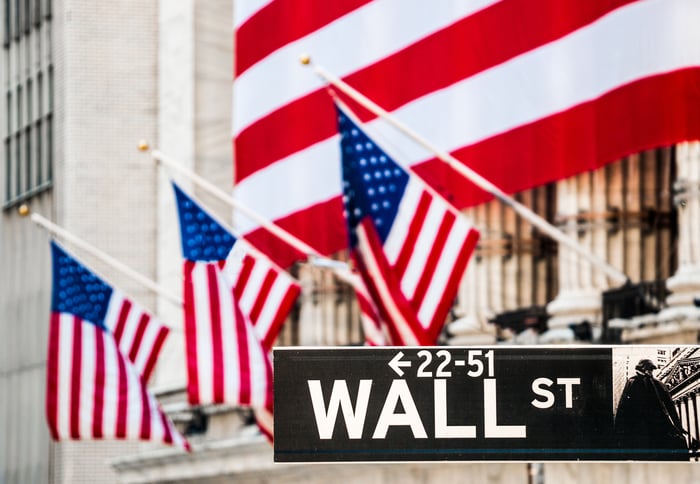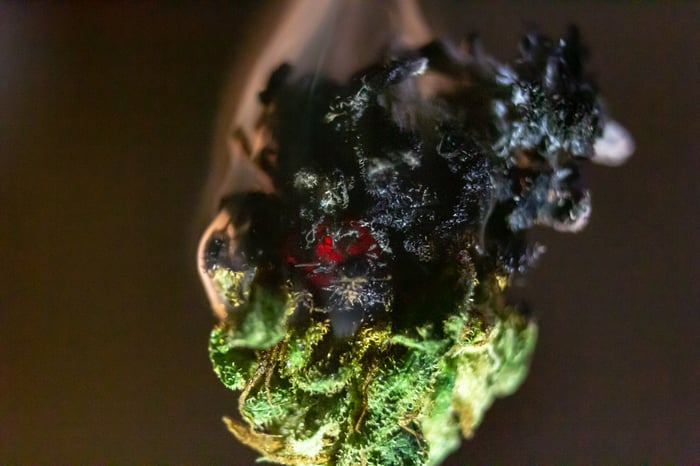For years, the marijuana industry has had investors seeing green. That's because the potential of the legal cannabis industry has appeared to far outweigh the risks. Promises were made of substantial production, a rapid ramp up in sales, and a quick push into profitability as consumers moved into legal channels to gobble up cannabis products.
While robust expectations remain, with up to $200 billion in annual worldwide sales predicted in a decade, the actual rollout of legalized marijuana in Canada and in select U.S. states hasn't exactly gone to plan. In Canada, supply issues have been persistent since recreational sales launched more than 11 months ago. Meanwhile, in the U.S., a combination of oversupply and exceptionally high tax rates in certain legalized states have encouraged black-market producers.
In short, things have not gone well, and that's been reflected in marijuana stock valuations over the past six months. But things could be about to go from bad to worse with the very first delisting from a major exchange possibly being imminent.

Image source: Getty Images.
There were high hopes for CannTrust when it made its debut on the NYSE
Since late 2016, we've witnessed a little over one dozen cannabis stocks make the move to a major U.S. exchange -- either the New York Stock Exchange (NYSE) or Nasdaq. One of the quirks about listing on a U.S. major exchange is, since marijuana is an illicit drug, no U.S. marijuana stocks are eligible for listing on either the NYSE or Nasdaq.
However, Canadian pot stocks that choose not to operate in the U.S. marijuana industry are allowed to list their shares on a major U.S. exchange. As a result, we've witnessed three initial public offerings (IPOs) on major exchanges, as well as 10 uplistings from the over-the-counter (OTC) exchange, with most of the industry remaining confined to the OTC exchange.
One of the companies that uplisted is Ontario-based grower CannTrust Holdings (CNTTQ), which began trading on the NYSE on Feb. 25, 2019. By moving from the OTC exchange to the big board, CannTrust aimed to gain better visibility, improved liquidity, and perhaps even favorable Wall Street coverage and/or investment.
It also had the hallmarks of a company that should attract the attention of cannabis investors. CannTrust's flagship grow campus Niagara was on track for 100,000 kilos of low-cost hydroponic production per year when at full capacity, with the company announcing outdoor grow output of between 100,000 kilos and 200,000 kilos per year, depending on how much land it acquired. As the icing on the cake, CannTrust is also one of four Canadian growers with supply deals in every province.
It was a major grower with a $1 billion market cap that looked to have a bright future. Then it went up in smoke.

Image source: Getty Images.
How quickly those hopes have faded
In early July, following a review from regulatory agency Health Canada, CannTrust announced that it had been growing cannabis illegally in five unlicensed rooms for a period of six months (Oct. 2018 - March 2019). These rooms were subsequently licensed in April 2019. As a result of this admission, CannTrust had 5,000 kilos of inventory placed on hold by Health Canada and temporarily lost its ability to sell cannabis products while the investigation was going on.
The problem is that things just got worse from there. Company emails suggest that now-former CEO Peter Aceto was aware of the wrongdoing and let it continue. This ultimately led to his firing as company CEO. Reports also emerged that fake walls were used to purposely deceive Health Canada, demonstrating the length that certain individuals were going to in order to keep this deception ongoing.
On Sept. 17, Health Canada finally issued its ruling. The regulatory agency officially suspended CannTrust's cultivation and sales licenses, although existing crops can be cultivated and harvested, with subsequent processing of this cannabis being allowed, such as drying, trimming, and milling. Nevertheless, all sales for CannTrust are currently suspended, meaning it's simply living off of its cash, for the time being, until it's satisfactorily complied with Health Canada's requests and its licenses are reinstated.

Image source: Getty Images.
Is delisting imminent?
However, this is far from CannTrust's only concern. It may soon get a dreaded delisting notice from the NYSE, with not one but two motions for removal.
For starters, the NYSE requires that its existing listings maintain a minimum share price of $1. On Wednesday, Sept. 25, CannTrust ended the session at $1.13 per share. If CannTrust's share price were to fall below $1 and stay there for a stretch of 30 calendar days, it would be in violation of the NYSE's ongoing listing requirements. CannTrust would be allowed to appeal the decision, thereby giving it time and alternatives to get its share price back up, which could include a reverse split.
Secondly, CannTrust has also failed to file its second-quarter operating results on time. This has to do with the ongoing investigation into the company's wrongdoing, as well as its inventory, which would certainly factor into the company's assets. Furthermore, auditor KPMG announced just over a week after CannTrust delayed its second-quarter filing that it would be withdrawing its report on the company's financial statements for fiscal 2018 and the first quarter of 2019. Being unable to file its financial statements in a timely manner may subject CannTrust to NYSE delisting.
Of course, delisting from the NYSE would rank pretty low on the totem pole of issues CannTrust needs to tackle for the time being. With the company laser-focused on regaining compliance with Health Canada and having its cultivation and sales licenses restated, it would not be the least bit surprising to see CannTrust earn the dubious honor of being the first marijuana company to get the heave-ho from a major U.S. exchange.





